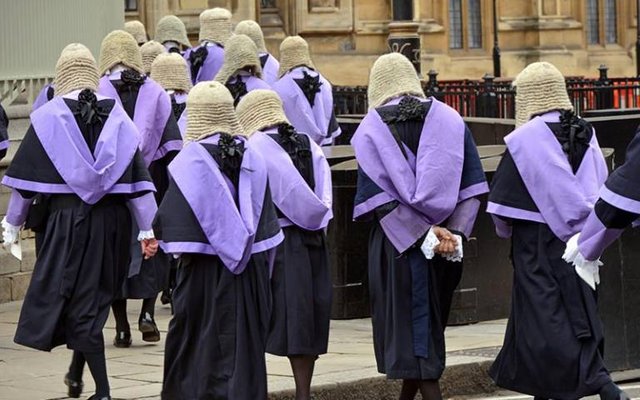A blockchain-enabled legal system.

As the internet has made it incredibly easy for economic activity to happen across borders, the economies of countries across the globe are becoming increasingly twined. While global commercial activity seems smooth on the consumer side, the back-end of business operations involves myriad disputes which often involve lengthy legal duress.
The technology boom of the digital age has disrupted virtually every industry, but the legal system has remained largely static. Most industries are seeing new participants, that are able to generate a service at an economical scale, dominate the market share. The legal system, on the other hand, remains expensive and slow, especially when it comes to the arbitration of cross-border disputes.
Efficiency in the handling of legal matters can enable increased business activity with lower operational frictions. Decreased costs can enable more entrepreneurs to enter global commerce as the fear of legal fees would be mitigated. A new blockchain development aims to provide legal services at scale by utilizing the key principle of blockchain technology: decentralization.
A New Legal System
Jur is a platform that decentralizes the process of arbitration. Rather than having law firms represent clients and arbitrating the process on their behalf, Jur provides a decentralized network of oracles.

One of the fundamental benefits of blockchain technology is to provide immutable records; then, blockchain 2.0 ushered an era of smart contracts. Jur combines these 2 factors to create immutable contracts that can be analyzed by oracles to arbitrate any dispute.
Participants of a legal agreement can create a Smart Legal Agreement (smart contract) and deposit funds into the contract. Should the business activity that had been agreed upon move along as intended, the contract releases the funds to the rightful recipient. However, if there is a dispute among the participants of the agreement, a decentralized network of Oracles can be called upon to arbitrate the process.
The arbitration process shall work as such:
- The disputing parties shall make a claim.
- Oracles, who meet the minimum amount of staked tokens, will weigh in on the evidence provided by the disputing parties.
- The party that receives the majority of the Oracles vote will receive the funds held in the Smart Legal Agreement; the Oracles voting for the losing side will lose their stake.
Expensive to be Unjust
Jur’s dispute resolution system delves off the classic PoS mechanism.

As Smart Legal Contracts will contain immutable terms of the contract, Oracles will simply need to match the evidence provided by disputing parties with the terms stated in the contract. The Oracles have staked tokens to gain the right of weighing in. The loss of staked tokens incentivizes Oracles to make the right decision.
The platform will be available for free for 3 resolution requests per month. After that, enterprises that utilize the service must pay a fee. A portion of these fees will fuel rewards for Oracles. Thus, Oracles are incentivized to remain just to gain their share of the reward and to avoid loss of their staked tokens. This is a sharply different from the current legal system where the jury has nothing at stake and faces no penalty for giving an improper decision.
Immediately Applicable
Given the rise of the gig economy and online fund raising, Jur can remove the trust factor between agreements. Provides the APIs to external enterprises so that they may seamlessly utilize the dispute resolution protocol.

Online freelance contracts can be issued as Smart Legal Agreements; fundraising on platforms like Kickstarter can ink terms on Smart Legal Agreements; ICOs can be launched with the integration of Smart Legal Agreements. Smart contracts are proven means of providing an escrow service.
However, most commercial activity is complex beyond basic contractual terms and off-chain incidents can render the decision-making power of a smart contract moot. Thus, an Oracle network that functions as a decentralized jury system fills in the gap to provide arbitration when necessary.
Utilizing the immutable state of the blockchain and the effectiveness of smart contracts to improve the state of the arbitration system is an incredible utility of blockchain technology and demonstrates the tangible benefits decentralization can provide to commercial activity.
Essential Links
🌐 Website: https://jur.io/
💡 Whitepaper: https://jur.io/content/uploads/2018/07/JUR-WhitePaper-v0.3-eng.pdf
👨 ANN Thread: https://bitcointalk.org/index.php?topic=5033562
💻 Telegram: https://t.me/jurcommunity

Connect with me:
Crypto News Crypto Airdrops ICO List Blockchain Lawyers


There probably needs to be a maximum number of tokens an oracle can stake into a case in order to avoid collusion. Unless, the losing tokens are burned.
Posted using Partiko Android
Losing side's tokens are given to winners.
nice
@swiftbot tip 100
⚡$$$ Tipped @hatu
⚡100.00000000 SWIFT! If you don't know how I work, replyhelpand I'll give you some help! Currently the price ofSwiftCashin the market is$0.0022 USDperSWIFT. Current value of the tip is$0.2200 USD. To find out more aboutSwiftCash, please read our whitepaper!This is a great start to a revolutionary, innovative idea. There are things that will need to be addressed in order for it to really revolutionize legal systems. For example, a lot of criminal law can be very emotional. However, if Oracles know that they will earn based on what the majority votes, many of them may actually vote against what is just/right and instead choose what they think the rest of the majority is likely to choose because of emotional or other factors. Oracles need to be given an incentive to pick what is actually "just" regardless of what they feel the majority or the "mob rule" is most likely say. It can be hard enough for many people to stand up for what is "right" despite what everyone else thinks, and it becomes harder if you know you will be penalised for it (not rewarded/paid for your work).
Additionally, sampling factors will need to be addressed to reduce bias. If you allow any Oracle to vote on an issue, you are going to have very skewed results because a certain issue is likely to chosen by many of the same people who have an interest in that issue, rather than an objective view. Also, different cultural and other factors can make a big difference, and there need to be constraints somewhat similar to jury selection (though hopefully better) in order to ensure more objective results.
This idea is great, and I hope it becomes further refined. I would recommend they review and apply some of the similarities to things tested out in other countries, etc such as that discussed in wired: https://www.wired.com/2012/05/st-essay-voting/ and implement those ideas into this concept to make it work as well as possible with as little bias as possible using correct statistical randomized sampling as much as possible.
This will largely be applied for commercial arbitration. Emotional cases are unlikely to fall under this.
As for the oracle network's potential for bias, the staked tokens put that to rest as oracles risk a loss for voting on the basis of personal convictions rather than evidence.
This is a great concept. The issue that needs to be overcome is this. When two parties agree to enter a contract like this it is almost announcing there is some sort of mistrust up front. Signing up for a crypto contact and all the hoops you must jump through takes much more effort than just signing your name on an agreement. Therefore, both parties will be wondering why the other is going to such lengths to set up and agreement like this.
Jur will provide a smart agreement marketplace. There won't be much effort needed to enter the agreement; it would also be faster than traditional arbitration processes.
Interesting project @hatu
A while ago I read about a similar project : Kleros , both have very good characteristics and seem to be the solution to many types of disputes that may arise, but I think that this type of project is not viable at this time, maybe in the near future is something very necessary but not for now.
Enjoy your day, Piotr.
Such a project can definitely be put to early use given the popularity of stablecoins and the adoption of blockchain technology within major companies like Walmart.
They already have a request from a Pharma company to use the service for a $2.5M escrow.
Lovely, you have some really good points but we are probably not there yet. Not now, not in 10 years, 20? Probably. Thanks man keep me updated!
This technology is being developed right now.
but sir why says that some countires blockchain is illegal and made the cause of money loundary ??
This project is about the development of a decentralized system, not a digital currency.
Your point is very good right now, I'm amazed
Entre mas y mas las cryptomonedas están tomando fuerza en el ámbito de transacciones sin pasar por ningún ente bancario para que aga la transacción ya que con ella depositamos toda nuestra confianza por que por este medio de pago podemos comprar muchas cosas sin tener la fobia de que no se pueda hacer la transferencia al remitente ya que pasa por solo una persona que valida la compra sin tener el temor de perder el dinero que vallamos a invertir.
exelente